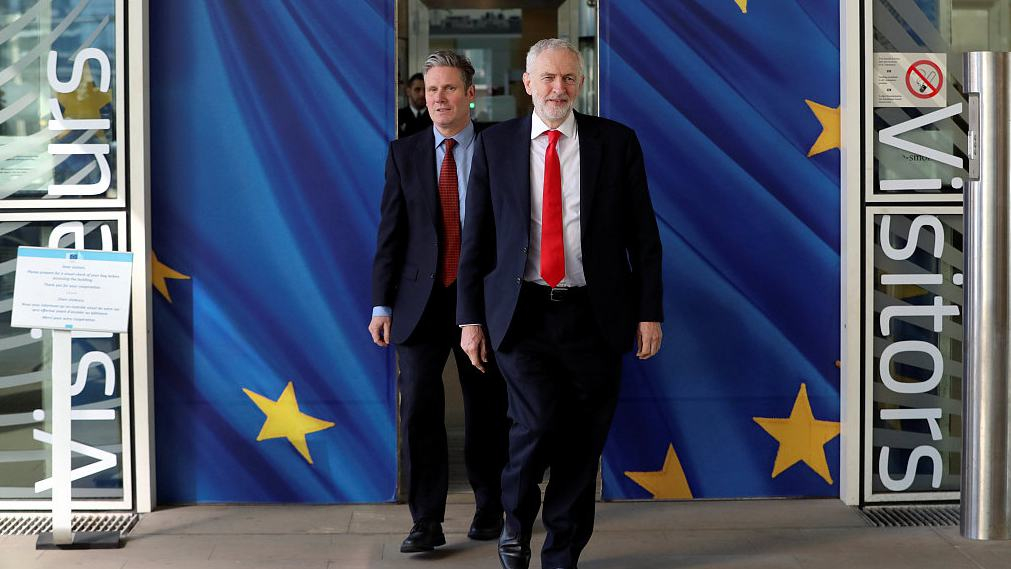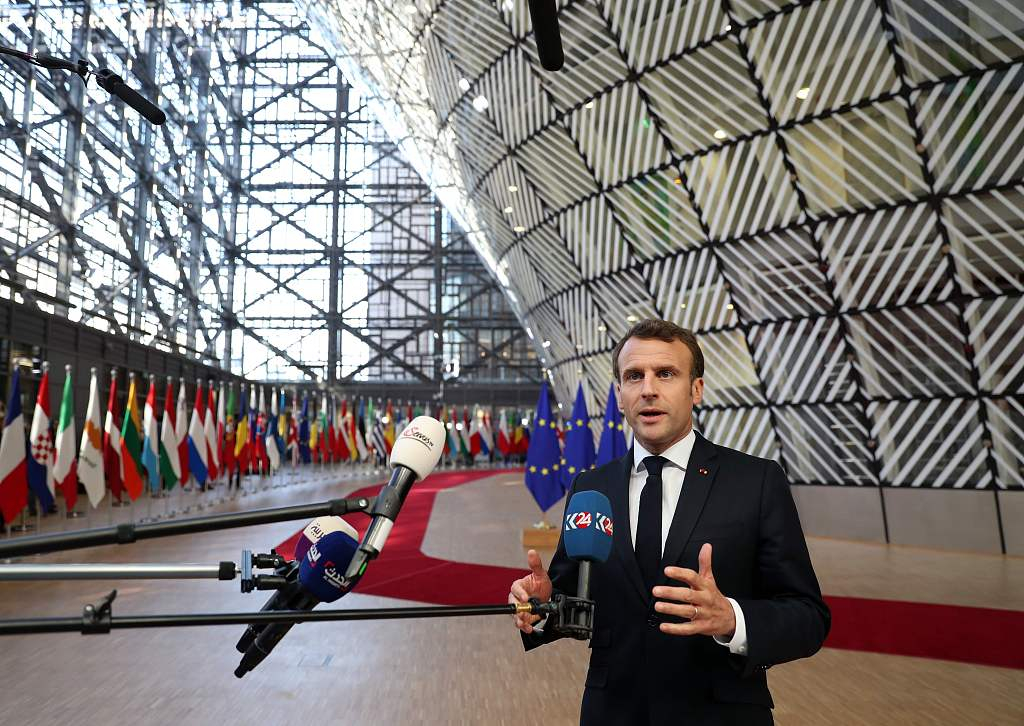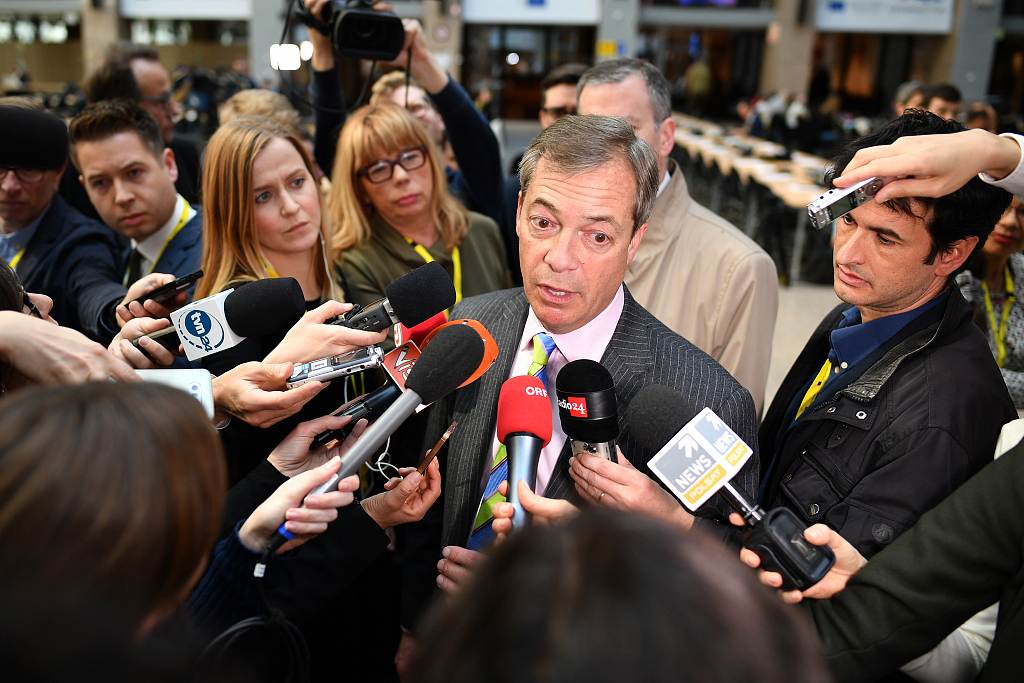
Opinion
10:39, 29-Apr-2019
British Labour Party's Brexit dilemma
Updated
15:39, 29-Apr-2019
Chris Deacon

Editor's note: Chris Deacon is a postgraduate researcher in politics and international relations at the University of London and previously worked as an international commercial lawyer. The article reflects the author's opinion, and not necessarily the views of CGTN.
On Tuesday, the National Executive Committee (NEC) of the United Kingdom's opposition Labour Party will meet to decide on its policy manifesto for the European parliamentary elections. These elections are due to be held in the UK on May 23, provided Brexit has not occurred by May 22.
The build-up to this meeting is being closely watched in the UK – and across Europe – because it will be the point at which Labour's NEC decides what their manifesto should say about a second referendum on Brexit. Do they support holding one or not?
Supporters of a second referendum – referred to by some as a "People's Vote" – are seeking a further poll in which the British public can show its support (or lack thereof) for Prime Minister Theresa May's withdrawal agreement with the European Union (EU).
Crucially, these supporters are also in favor of a second referendum containing an option to cancel Brexit and remain in the EU.
So far, several smaller parties in the center and on the left-wing of British politics have backed such a vote, including the Liberal Democrats and the newly formed Change UK. On the other hand, vehemently against a second referendum are the newly formed Brexit Party, as well as the governing Conservative Party.
The opposition Labour Party has, however, walked a tightrope on the issue, not clearly coming down on one side or the other. The party's policy, as adopted at its annual conference last year, has been to leave "all options on the table," including supporting a second referendum.

France's President Emmanuel Macron speaks to the press as he arrives ahead of a European Council meeting on Brexit at The Europa Building at The European Parliament in Brussels, April 10, 2019. /VCG Photo
France's President Emmanuel Macron speaks to the press as he arrives ahead of a European Council meeting on Brexit at The Europa Building at The European Parliament in Brussels, April 10, 2019. /VCG Photo
At the same time, however, the party's top brass – including leader Jeremy Corbyn and his team – appear very reluctant to commit to a further public vote and have repeatedly insisted that there is a version of Brexit they would support.
Such a non-committal approach has allowed the Labour Party to get away with sitting on the fence up to this point, capable of attracting both Brexit supporting and Remain-supporting voters.
Labour has a particular problem with the whole issue of Brexit because it attracts support from highly liberal metropolitan cities like London as well as its heartlands in working-class communities, particularly in the north of England.
In the 2016 referendum, the former group showed strong support to remain in the EU, whereas the latter showed strong support to leave. This division among Labour's supporters is nothing new, but it has never been brought out into the open quite as much as it has by Brexit due to the binary nature of the vote.
Here we have Labour's dilemma on Brexit: If it comes down firmly in support of Brexit, it will alienate a large proportion of its support, particularly among students and liberal city-dwellers. On the other hand, if Labour backs a second referendum which could cancel Brexit, it will likely hemorrhage support in working-class English communities.
For this reason, the party has attempted to be all things to all people – neither fully backing, nor rejecting a second referendum; attacking Theresa May's deal with the EU, but stating that they have a better plan for Brexit themselves. In essence, the Labour Party's policy on Brexit has been one of coordinated ambiguity.
However, this issue is now coming to a head. With the European elections coming up in less than a month's time, an expectation that the poll will act as a proxy second referendum on Brexit has quickly developed.
The Brexit Party is showing strong support in opinion polling to the great concern of Remain supporters. These supporters are split between multiple parties, who are therefore doing poorly in the polls. For this reason, Remain-supporting parties such as Change UK have sought to boost their support by arguing that Labour voters who are against Brexit should vote for them, rather than Labour, because the latter has not committed to a second referendum.

Leader of the Brexit Party and MEP Nigel Farage speaks to the press inside the EU Council headquarters in Brussels, April 10, 2019. /VCG Photo
Leader of the Brexit Party and MEP Nigel Farage speaks to the press inside the EU Council headquarters in Brussels, April 10, 2019. /VCG Photo
Concerned by the prospect of both losing votes to such parties and the Brexit Party winning the elections, Remain-supporting members of the Labour Party, including prominent Members of Parliament, have therefore increased their pressure on party leaders to commit to a second referendum, arguing that this is the only way to beat the Brexit party in the European elections.
Tuesday may, therefore, be crunch time for the party. Will it adopt a policy to support a second referendum in its manifesto or not? This decision alone could be the key to the results of the European elections in the UK.
That said, the Labour Party up to this point has skillfully avoided taking one side by using caveats and non-committal wording. It would be naive to think that they might not try exactly the same trick once again in these elections.
But as long as Theresa May is unable to deliver Brexit, the Labour Party will not be able to dodge the issue, leaving it for the Conservative Party to own, forever.
If the Brexit paralysis continues – as appears likely – sooner or later, Labour will have to bite the bullet and make up its mind: Does it want to leave the European Union or not?
(Cover: Britain's opposition Labour Party leader Jeremy Corbyn and the party's spokesman on Brexit Keir Starmer leave after a meeting with European Union's chief Brexit negotiator Michel Barnier in Brussels, Belgium, March 21, 2019. /VCG Photo)
(If you want to contribute and have specific expertise, please contact us at opinions@cgtn.com.)

SITEMAP
Copyright © 2018 CGTN. Beijing ICP prepared NO.16065310-3
Copyright © 2018 CGTN. Beijing ICP prepared NO.16065310-3